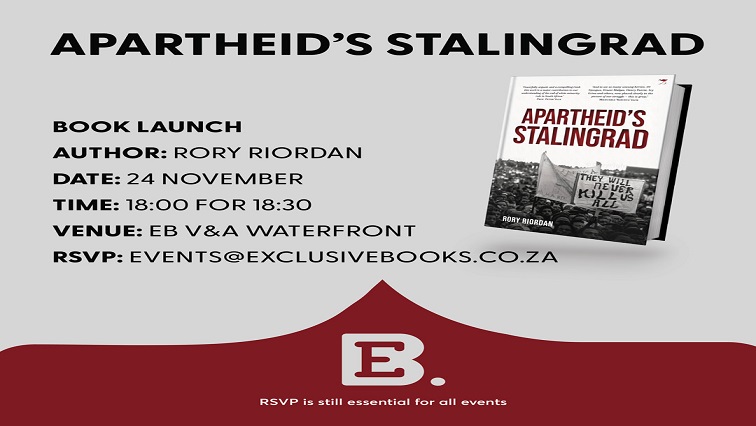Author and anti-apartheid human rights activist, Rory Riordan’s new book recalls how the townships of the Eastern Cape, in particular Gqeberha and Kariega, defied the apartheid state.
“Apartheid’s Stalingrad” reflects the happenings between the banning of most political movements in 1979 and their subsequent unbanning in 1990. The book gives an insight into the township’s involvement in bringing about this once unimaginable change.
As the country approaches its third decade of democracy, this is an opportunity for many to reflect on the turning points that gave hope to so many. And the recent COVID-19 lockdown – a time of uncertainty and disruption for many people – provided Rory Riordan with the perfect opportunity to write.
“They said we were going to lockdown for two weeks. I remember that. And I thought, two weeks, what’s going to have changed in two weeks with this virus and I thought Cyril, let’s be long-term on this thing. We’re going to be out of our normal way of doing things for quite a while. And so then, I thought I’d settle down and I’d write a few things,” says Riordan.
He says while writing on different topics his background as an activist kept pulling him into politics.
“I wrote about many different things to keep myself busy, but then I was always being pulled back into the political stuff because I spent years in the human rights trust. From 1986 to 2003 I was in the human rights trust. I have all that documentation here that I kept when the trust closed down and I was pulled back into that and I think if I were to die, to put it bluntly, my wife wouldn’t know what any of this is. We weren’t married yet at that stage. The stuff would all be taken off and parked. And that would be a great pity because there’s a lot of great stuff there,” he explains.
“So I sat down and I wrote, and I wrote and I wrote. It got bigger and bigger and bigger and the wonderful Bridget, the owner of Chikane said she wanted to publish it and she hadn’t even seen it at that stage. She said she would publish it no questions asked.”
Riordan says a lot of adjustments had to be made to tell a particular historical story. He says he initially wrong more than 700 pages and was asked by the publishers to cut it down.
“I wrote and I wrote and eventually I had 770 pages of document, which I sent to my publisher and I got a phone call, ‘Rory, Rory, today people read tweets and they read one-line WhatsApps, they do not read 770 page books. Do something about it.’ So I had to cut the thing down and it’s still a big book, 500 pages.”
While Riordan approves of the current ANC government, he is wary of what the organisation is becoming.
“I’ve seen the ANC change overtime from being a non-racial organisation to being an Africanist organisation. When you look at the list of the NEC, you realise that people just accepted that as it was. There is one white person and I don’t think there are any coloured people and that wasn’t the ANC of 1994. The ANC of 1994 was determined to being non-racial. It’s lost that determination because it frightens people away and it frightens people into the hands of the DA and that’s wrong.”
Riordan believes that he has shown the province’s political history in a new light. He encourages other authors to share more of South Africa’s rich political history by documenting their work so that future generations can learn from it.


